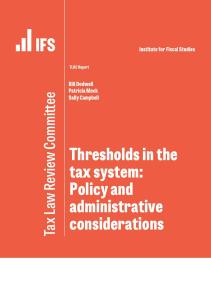Access
The value-added tax (VAT) is a cornerstone of the modern tax system. It has many desirable properties in theory: it does not distort firms' production decisions, it is difficult to evade, and it generates a substantial amount of revenue. Yet, in many countries there are discrepancies between the textbook model of the VAT and its practical implementation. Where the VAT implementation diverges from its textbook model, the tax may lose its desirable properties. We draw on firm-level administrative VAT records from 11 countries at different income levels to examine the functioning of real-world VAT systems. We document four stylized facts that capture departures from the textbook VAT model which are particularly pronounced in lower-income countries. We discuss the effects on VAT performance and simulate a counterfactual retail sales tax and a turnover tax. Despite its shortcomings, we conclude that the real-world VAT is superior to the alternatives.
Authors

Associate Director
Anne is head of the tax and development group at IFS and an honorary faculty member at UCL. Her work focuses on tax policy in lower-income countries.

Research Fellow International Centre for Tax and Development
Giulia is Research Fellow at the Institute of Development Studies(IDS) and Research Director of the International Centre for Tax and Development(ICT).

Research Economist
Vedanth is in the TaxDev sector. His research is on taxes in developing countries, with a particular focus on VAT.

Research Fellow University of Manchester
Mazhar is an IFS Research Fellow and an Associate Professor in the Department of Economics at the University of Manchester.

Research Fellow CUNEF
Miguel is a Research Fellow at the IFS and an Assistant Professor in the Department of Economics at CUNEF Universidad, Madrid.
Journal article details
- DOI
- 10.1257/jep.38.1.107
- Publisher
- American Economic Association
- Issue
- Volume 38, Issue 1, February 2024, pages 107-132
Suggested citation
Almunia, M et al. (2024). 'Does the value-added tax add value? Lessons using administrative data from a diverse set of countries' 38(1/2024), pp.107–132.
Datasets used
More from IFS
Understand this issue

Cake or biscuit? The UK's byzantine VAT system explained
16 November 2023

Should the government levy VAT on private school fees?
9 November 2023

British tax system is in need of reform
15 September 2023
Policy analysis

The government’s record on tax 2010–24
10 June 2024

14 years of missed opportunities – big tax challenges remain unaddressed
10 June 2024

Thresholds in the tax system: Policy and administrative considerations
14 February 2024
Academic research

Targeting men, women or both to reduce child marriage
28 May 2024

Keeping the peace whilst getting your way: Information, persuasion and intimate partner violence
17 May 2024

The role of hospital networks in individual mortality
13 May 2024